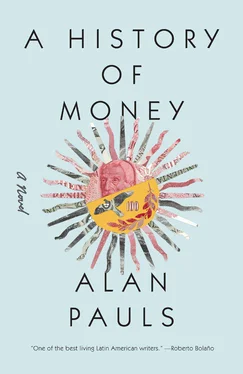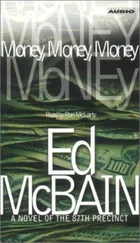This phase lasts ten years — more or less the same amount of time it takes Sonia to go from adoration to weariness, until one day she turns him out onto the street with a cardboard box full of clothes (minus the items she’s bought him during their time together, all of which are in exquisite good taste, particularly that tweed jacket, and which now fit the delinquent like a glove) as well as a plastic bag containing his dream diary, his little medal, his envelope full of baby pictures, his die, and his tin frog, which is still leaping around in thin air, like a badly castrated cat investing the remaining drops of its instinct in copulating with stuffed toys like an absentminded robot; and a piece of paper torn untidily from the phone pad that lists the days and times of his visits with the delinquent, who for good or ill has ended up growing fond of him. In ten years, the Beast passes through more than one change of identity; every time, the house sitters act as figureheads (the only demand his mother and her husband successfully uphold throughout the whole process), and every time, it’s all in vain. There’s a first attempt at time-sharing, which starts off well (with 80 percent occupation) but soon dies out, having been eclipsed by the mania for all-inclusive resorts and their exclusive hedonism. After that come three years as an eco lodge; years of ugly forest-green paint and solar panels that can never make up their minds to work. Then another bid at time-sharing, a concept that’s won back some followers during an interim of economic crisis, recession, and unemployment. From then on, it’s free fall. It becomes the headquarters of a burgeoning local property development firm that goes under the same year it moves into the Beast, whose owners, a pair of incestuous cousins, have to be forcibly evicted by the police, leaving behind them a year’s unpaid rent, utilities, and local taxes. It’s the part-time headquarters (for long weekends only, since they’re perfect for marathon sessions of psychodrama, sensory perception, transcendental meditation, and yoga) of a fraudulent “holistic health clinic” that contacts them via the rugby guy, who has recently been named consul or military attaché or first secretary of the Argentine embassy to South Africa, where his old friends on the All Blacks await him eagerly. It becomes a production house and, later, a film studio, first for ad spots (the pool in that soda ad, the spiral staircase where the husband gives his wife two tickets to Punta Cana, the big living room with the chimney and the built-in bookshelves where those twin brothers wage their chocolate-cookie war), then for two or three experimental films that are never screened, in which the production house’s director ends up investing (and losing) the little money he’s earned, and which, according to the few surviving members of the cast who are prepared to talk about it, turn into huge, pointless orgies (the guy has high blood pressure and diabetes and is incurably impotent). At the end of this tunnel, the Beast is a wasteland, a Xanadu with no electricity and almost no glass in the windows, where the wind plays outlandish harmonies and animals sleep and reproduce; which even the house sitters have fled (after auctioning off the little remaining furniture, their only means of getting their outstanding pay), and which isn’t even entirely theirs. Hoping that it’ll bring in an injection of capital, they signed 40 percent of the partnership over to two associates — another architect and the owner of a tourism company — who are even less sharp than they are.
“That’s it. It’s over, ” his mother tells him one afternoon, with her coat still on and her shaking hands twisting her purse out of shape while she sits on the edge of a two-seater wicker chair that, even though it’s impertinently ugly, is the only thing that could be called furniture in the studio-pigsty he moves into after Sonia throws him out: “We’ve split up. I’m living in a hotel. And I’m out of cash.” Standing up, he can only manage to ask: What does that mean. He’s wearing the orange terry-cloth robe that sometime later he will take to the hospital his father’s staying in, having grown tired of seeing him patrol the corridors in his old jogging pants. It’s the only thing he can think to say. He skims over the news about the separation. He’s thought about it so many times that it’s as though it had already happened. He’s not even interested in his mother. It’s that phrase that interests him. What does I’m out of cash mean? The phrase alone, in and of itself, beyond the expression of awestruck stupor on the mouth that says it, and beyond the low, subdued tone of voice it’s said in, the tone of someone speaking through sleep or medication. He knew it; he’s always known it. But now it’s his mother who knows it, while he — beaming and looking as simple and radiant as the picture of an idiot — is in disbelief. It’s like something we’ve witnessed a thousand times in films or in our dreams or in other people’s life stories suddenly happening in real life; something that can’t surprise us because we already know every detail. It doesn’t surprise us: it freezes our blood. Not the event itself, but rather the supernatural, absolutely miraculous dimensional shift that must have taken place in order for it to break through the shell surrounding the world it normally occurs in and travel to ours and turn it on its head. “ ‘What does it mean?’ ” his mother repeats, now looking at him for the first time, with a mixture of disdain and compassion. And the answer: “Nothing. It doesn’t mean anything.”
Ah, if only he could have given the same response every time he’s been asked the same question. Why hasn’t he ever been able to? Why has he always preferred to have something to say rather than nothing? Who made him the guardian of the supposed meanings of things? There’s his disabled group, for a start, whose members are always so desperate to know everything. For a few months, no doubt to fool himself that he’s not a kept man, he agrees to watch and discuss films with a group of culturally curious sexagenarians, a sort of private film society. They meet once a week, always at a different member’s house. They don’t pay much, but the payment is rhythmical, regular — the closest he’s come to a job in many years. The disabled bunch — as he calls them, inspired by the leader of the gang, a brilliant, extroverted retired accountant confined to a wheelchair by a degenerative disease — are kind and welcoming. The women crown every meeting with a big ethnic feast (hummus, falafel, goulash with spätzle), offer to fix the button dangling from his jacket, and show him their family photo albums, casually pointing out the niece or granddaughter who might suit him. The men offer him cigars and slap him confidentially on the knee before asking him who he’s planning to vote for — almost all of them started out on the left, and though they no longer belong to that past, it still dictates their gestures, behavior, reactions, and manner of speaking, like a country they once fled and have no intention of going back to, though they owe it everything and will never forget it — or offer him their varied contact lists in case he needs a loan, a discounted refrigerator, or free printing for some wedding invitations. They all trust him, invest him with an authority he doesn’t have, and swallow in wordless, reverential silence the sprawling Soviet and Czech and Hungarian films he shows them in order to ingratiate himself to — or maybe finish off forever — their legendary militant youths.
Very soon, though, their reserve dissolves and they grow more confident, and when they come across a dense, studied image on the screen that they don’t understand but can tell is full of meaning, fit to burst with it, they finally pluck up their courage, raise a shaking hand, and ask: “What does that mean?” That’s how it begins: the disaster, the epidemic, the domino effect. What does that mean, that sled that’s lashed by snow in the glass globe that falls out of the dead man’s hand? And what does that mean, that old workboot with no laces that’s been left in that ruined anti-aircraft shelter? What about the darning the heroine devotes herself to in the final scene, when she’s surrounded by toothless, homeless wasters? And the old spinning top that never stops turning? And the two song verses the protagonist tries in vain to remember, which come back to him only at the end of the film? And that broken window, that stained petal, the clock that tells the time backward in that old bar in a Portuguese port?
Читать дальше












